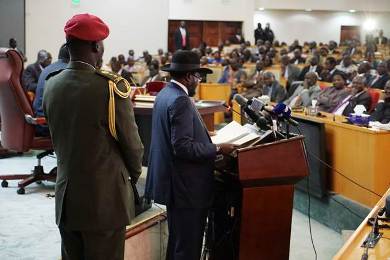South Sudan legislators warn of tribal war over 28 states constitutional amendment
November 20, 2015 (JUBA) – South Sudanese members of parliament under the leadership of president Salva Kiir have warned of imminent tribal war in the country due to the constitutional amendment which seeks to impose 28 states against the will of the people of the newly founded country.

37 members of parliament from Equatoria region and 29 members from Upper Nile region, mainly from the Nuer ethnic group in government issued three separate statements rejecting and condemning the manner in which a section of members of parliament have sought to amend the constitution to give the president more powers to dissolve and appoint members of parliament and state governors during the interim period.
They asserted that the move violates the terms of the peace agreement and warned that it would be a recipe for a tribal war if it is implemented.
James Kueth Chuol, chairperson of Nuer parliamentary caucus in the national legislative assembly said in a statement his group decided to keep away from participating in the vote which would authorize giving away a land of their ancestors to other community in the area.
“We shall not accept to be part of the parliamentary resolution that gives legitimacy to other community to take away our land. Therefore, we opted to distance ourselves from any imposed act that contradicts with parliamentary procedures and impinged the ancestral rights of our community,” the 18 November statement extended to Sudan Tribune reads in part.
The legislators, according to the statement whose authenticity was confirmed by the Nuer caucus chairperson, Chuol, himself during an interview with Sudan Tribune on Friday, said the establishment order of the president has violated not only the peace agreement which president Salva Kiir and the leader of armed opposition signed in August to end more than 20 months conflict in the country but also undermines peaceful coexistence of the people.
“We believed the order is untimely for the sake of restoration of terribly broken social fabric among our communities and unity of people of South Sudan and their peaceful co-existent. We gravely believe that creation of administrative areas out of conflict along ethnic lines is a recipe for tribal war,” the statement signed by the Nuer caucus members from Unity, Upper Nile and Jonglei states further warned.
However, nine Nuer members of parliament, including Riek Gai Kok, decided to succumb to the presidential pressure and voted in favour of the constitutional amendment despite rejection by the majority of the Nuer members in the caucus including their chairperson, Chuol.
Thomas Wani Kundu, head of parliamentary committee on information at the national legislative assembly, representing the Equatoria caucus, also said in a statement his group of 37 members from Equatoria decided to walk out of parliament because they believed it was not the competence of the national legislative assembly to change territories and name state capitals.
The group earlier in a statement called on the minister of justice to withdraw the bill which sought amendment of the constitution to insert 28 states, saying this was a violation of the peace agreement and the constitution of the country.
“In view of the foregoing (2(a),(b) it is clear that the issue of the establishment and approval of the number of states in Republic of South Sudan is the competence of the Council of States,” partly reads their statement in protest of the parliamentary procedure.
The parliament was also accused of violating the procedures when the two-third majority needed for the sitting was not attained in the process as the 66 MPs who walked out were also included in the declared quorum of 189, which was also did not reach the required quorum.
The 28 states is seen to be redrawing boundaries between communities and taking lands away from some communities and giving them away to other communities, particularly the ruling Dinka community from which the president hails.
The 28 states proposal is widely criticized by the opposition faction of SPLM-IO, former detainees, civil society organizations as well as by regional and international countries and bodies as a violation of the peace agreement signed between president Kiir and opposition leader, Riek Machar, on the basis of the 10 states.
A mandate to amend the current states per the agreement is a competence of the constitutional amendment committee and the future transitional national legislature that will be formed under the provisions of the peace agreement.
(ST)
